The Family Guy episodes are celebrated for their innovation and boundary-pushing narrative style, earning high ratings for their unique humor, clever references, and intricate storytelling. Standouts such as 'Da Boom', with its apocalyptic storyline and mutated residents, 'Blue Harvest', a brilliant homage to the original Star Wars trilogy, and 'Three Kings', offering a scintillating view into Stephen King's novels with an impressive IMDb rating of 8.1, exemplify the show's diverse and engaging content. Other memorable episodes delve into engaging narratives and provide critiques of relevant societal issues, like 'Death is a Bitch' and 'PTV'. Episodes like 'Stewie Loves Lois', 'Meet the Quagmires', and 'Back to the Pilot' showcase emotional depth, nostalgia, and innovative narrative techniques, including meta-humor. This brief overview just scratches the surface, as further exploration reveals a rich blend of satire, drama, and character development that makes each episode a remarkable viewing experience.
Key Takeaways
- 'Da Boom' and 'Blue Harvest' episodes are highly rated for their creative narratives and humor, with IMDb ratings of 8.1.
- 'Three Kings,' 'Death Is a Bitch,' and 'Stewie Loves Lois' episodes are noted for their innovative storytelling and satirical wit.
- 'Meet The Quagmires' and 'The Simpsons Guy' episodes offer unique alternate realities and cross-series interactions, adding humor and nostalgia.
- 'PTV' and 'And Then There Were Fewer' episodes are rated highly for their social commentary and seamless blending of suspense and comedy.
- 'Back To The Pilot' episode is acclaimed for its innovative narrative, meta-humor and revisiting the show's beginnings in a unique way.
"Da Boom" Episode Breakdown
Certainly one of the most memorable episodes in the Family Guy series, 'Da Boom' ingeniously incorporates a post-apocalyptic storyline, inspired by Y2K fears. This episode showcases the show's evolving humor and creativity by introducing the recurring and popular Chicken fight gag.
'Da Boom' cleverly utilises the post-apocalyptic setting to present a Quahog in ruins, populated with mutated residents, adding a peculiar but delightful twist to the plot. The episode's unique blend of humor, creativity, and unexpected narrative arc has garnered it an IMDb rating of 8.1, underscoring its popularity among audiences.
Released as part of Family Guy's fourth season, 'Da Boom' symbolises the show's capacity to innovate and push boundaries, all while staying true to its signature brand of humor.
"Blue Harvest" Episode Review

In homage to the original Star Wars trilogy, the 'Blue Harvest' episode of Family Guy, released in 2007 for the anniversary of 'A New Hope', presents an exceptional blend of humor, clever references, and unique reinterpretation of iconic scenes, making it one of the most highly-regarded episodes in the series. The episode's clever reimagining of beloved characters, with Chris as Luke Skywalker and Lois as Princess Leia, enhanced its appeal for Star Wars and Family Guy fans alike.
| Character | Star Wars Counterpart | Actor |
|---|---|---|
| Chris | Luke Skywalker | Seth Green |
| Lois | Princess Leia | Alex Borstein |
| Stewie | Darth Vader | Seth MacFarlane |
| Peter | Han Solo | Seth MacFarlane |
The episode's successful fusion of the two universes underscores the creative genius behind Family Guy.
Insights Into "Three Kings"
Shifting gears from the galactic humor of 'Blue Harvest', 'Three Kings' emerges as another standout episode, this time offering a satirical lens into the world of Stephen King's most recognized novels. This Emmy-Winning Episode cleverly parodies Stephen King classics like 'Stand by Me' and 'The Shawshank Redemption'.
Seth MacFarlane again proves his unique comedic prowess, seamlessly merging the distinctive humor of Simpsons Guy with Family Guy's signature style. Importantly, the episode presents memorable interactions between Cleveland and Peter, evoking a sense of belonging in viewers, akin to Guy and The Simpsons.
With an IMDb rating of 8.1, 'Three Kings' undeniably ranks among the Best Comedy episodes of Family Guy, a sign of MacFarlane's innovative storytelling and wit.
Discussing "Death Is a Bitch"
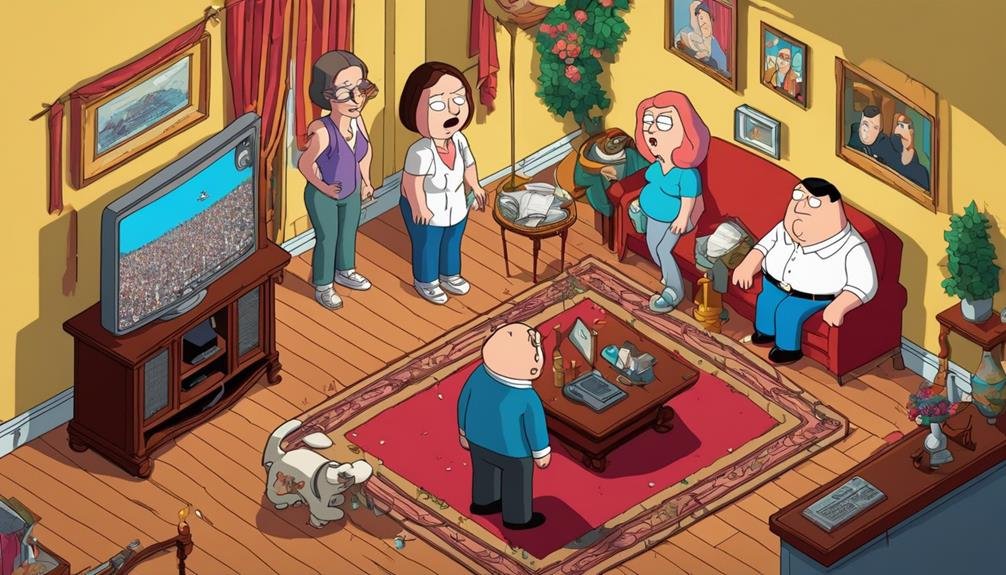
Exploring a different thematic territory, 'Death Is a Bitch' presents an intriguing narrative where Peter Griffin, in an attempt to evade insurance payments, fakes his death, setting off a chain of events that are both comically chaotic and conceptually innovative. This episode excels in its balance of absurdity and relevance, with Norm Macdonald's vocal performance as Death adding a unique flavor.
| Episode Element | Description |
|---|---|
| Thematic Focus | Insurance fraud, Death's duties |
| Lead Character | Peter |
| Guest Star | Norm Macdonald |
| Key Outcome | Chaos |
| Resolving Factor | Death recuperates |
As Death recuperates, Peter steps into his shoes, leading to anarchy. This insurance fraud plot provides a humorous take on morality and consequence, while successfully engaging the audience in its relatable chaos. 'Death Is a Bitch' is indeed a standout in Family Guy's vast repertoire.
"Stewie Loves Lois" Explored
Bringing emotional depth and complexity to the forefront, the episode 'Stewie Loves Lois' skillfully explores Stewie's attachment to his teddy bear Rupert and his turbulent relationship with Lois. It offers an engaging narrative that is further enriched by Peter's legal battle with Dr. Hartman.
The episode boasts an IMDb rating of 8.2 and investigates the nuances of the infant's emotional attachment, particularly his falling out with Lois. This sophisticated twist adds layers to the storyline, making it not only a comedic spectacle but a confirmation of the show's ability to handle complex emotional narratives.
Essentially, 'Stewie Loves Lois' stands out as an exemplary Family Guy episode, demonstrating a perfect balance of humor, drama, and character development.
Analysis of "Petarded"
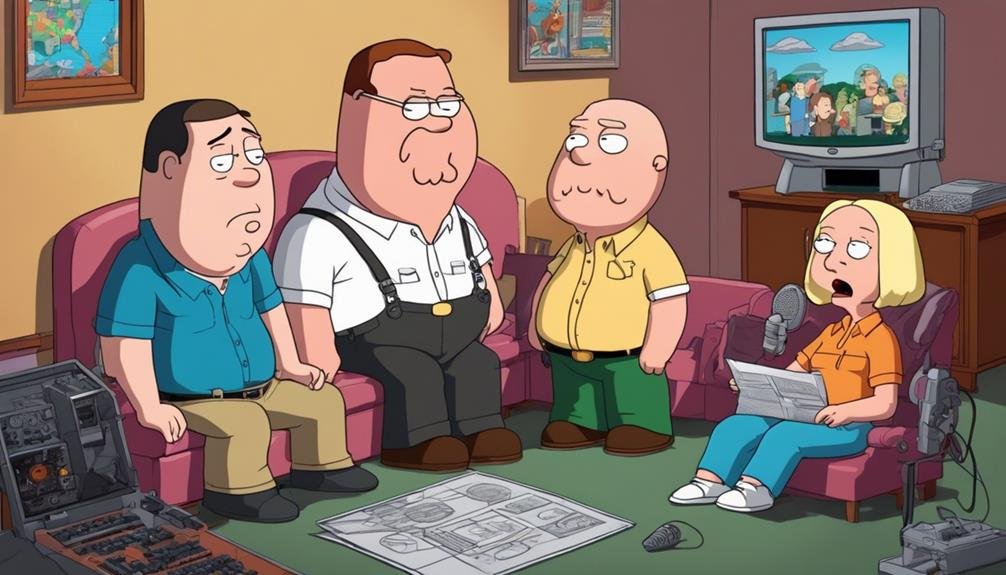
Delving into the contentious episode 'Petarded', we observe a distinct shift in the show's dynamic as Peter is diagnosed with an intellectual disability. This event not only challenges societal norms but also intricately explores his ensuing superiority complex.
The episode is distinguished by a dark humor that does not trivialize developmental issues but rather spotlights Peter's overblown sense of self-importance.
| Aspect | Analysis |
|---|---|
| Diagnosis | Peter's diagnosis as intellectually disabled pushes boundaries of appropriateness while offering a fresh narrative in Season 4. |
| Superiority Complex | Peter's inflated ego, despite his diagnosis, is a satirical critique of societal attitudes towards intellectual disability. |
| Humor | The humor in 'Petarded' is daring, not making light of genuine developmental issues but rather using them to expose Peter's character flaws. |
| Season 4 | 'Petarded' played a pivotal role in Family Guy's successful return after cancellation, setting the tone for subsequent seasons. |
This detailed, analytical exploration of 'Petarded' invites Family Guy fans to reevaluate the episode's place within the show's canon.
"Yug Ylimaf" Episode Highlights
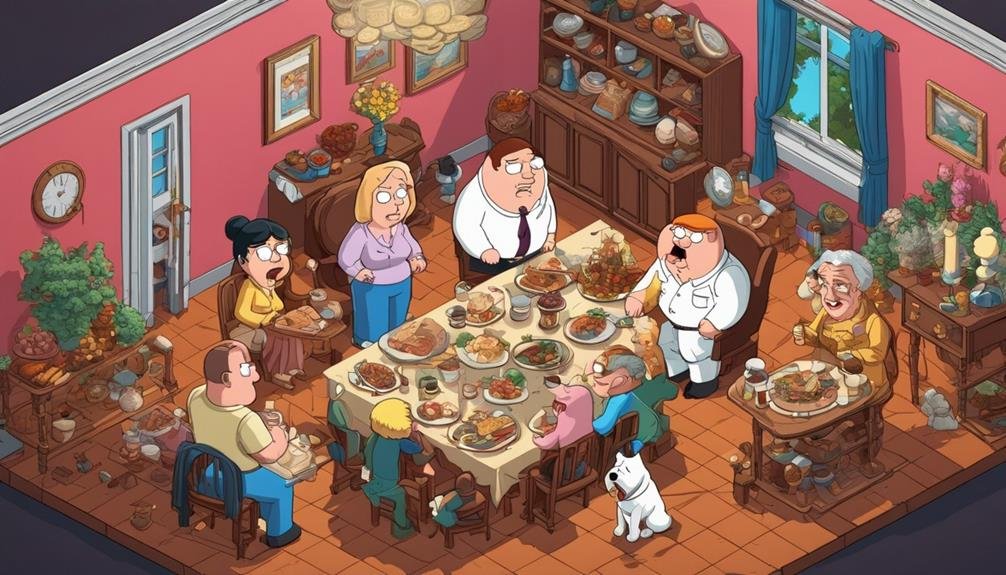
In the intriguing episode 'Yug Ylimaf', the fourth installment of Family Guy's eleventh season, we witness an unconventional narrative device as time paradoxically runs backward due to Stewie's malfunctioning time machine, creating a unique blend of humor and storytelling.
This novel approach flips the script on traditional sitcom narratives, leading to a series of reversed chronological events for the Griffin family. The backward time element serves as a fertile ground for the show's trademark humor, making 'Yug Ylimaf' a standout in the season.
The episode crafts its own narrative identity, offering a fresh perspective on the series' familiar comedic formula. The clever integration of Stewie's time machine mishap and the reversed timeline underscores Family Guy's ability to consistently push the boundaries of animated sitcom storytelling.
Inside "Stewie Kills Lois"
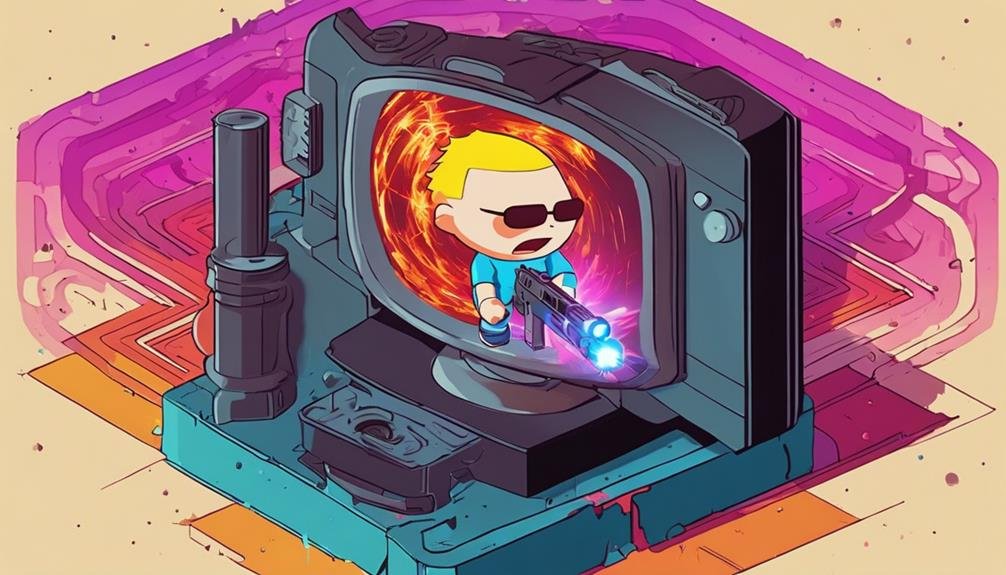
'Stewie Kills Lois', a two-part narrative in season 6 of Family Guy, represents a pivotal moment in the series that showcases Stewie's sinister intentions towards Lois, his mother, inadvertently resulting in her disappearance. This narrative arc profoundly explores Stewie's dark side, and the intricate dynamics of his relationship with Lois.
The episode is characterized by:
- Impactful storytelling: The tension-filled narrative keeps the viewers on their toes, with the unexpected disappearance of Lois.
- Character development: Stewie's character evolves markedly, portraying his dark side in a new light that is both intriguing and unsettling.
- Unexpected twists: The episode is replete with unforeseen turns, making 'Stewie Kills Lois' an unforgettable viewing experience.
"Lois Kills Stewie" Explained
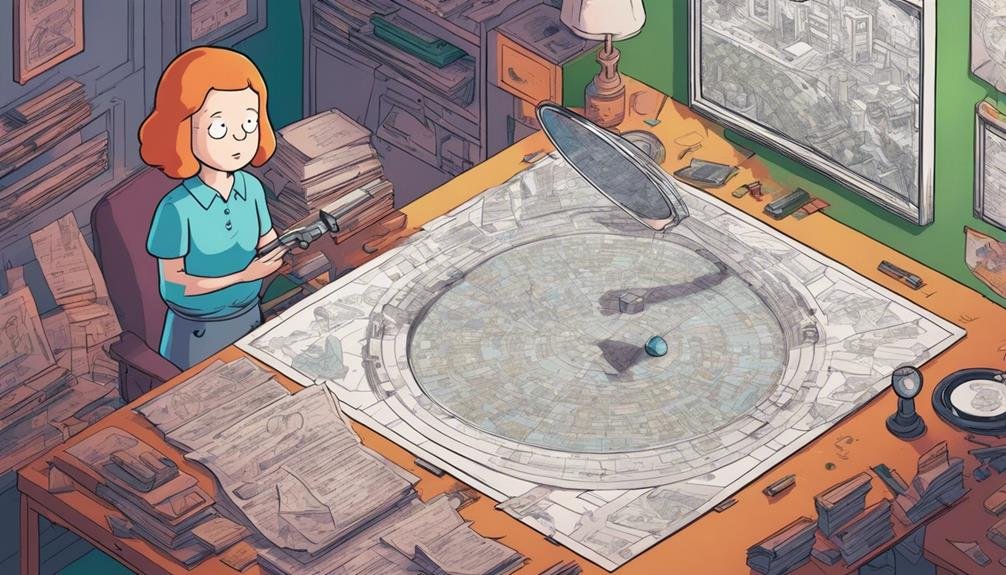
The season 6 finale, 'Lois Kills Stewie', serves as a dramatic culmination to the two-part narrative, featuring Stewie's audacious attempt to eliminate Lois using a mind control device, thereby profoundly altering the mother-son dynamic. This pivotal Family Guy episode is characterized by a dramatic story arc and high stakes, with Stewie's elaborate scheme unfolding in a suspenseful manner.
The narrative is ingeniously crafted, capturing the tense and enthralling atmosphere that encapsulates the essence of the show. The shocking twist at the end redefines the relationship between Lois and Stewie, leaving the audience yearning for more. 'Lois Kills Stewie' stands as proof of the creative brilliance behind Family Guy, making it a must-watch for both seasoned and new viewers.
Reviewing "Meet The Quagmires"
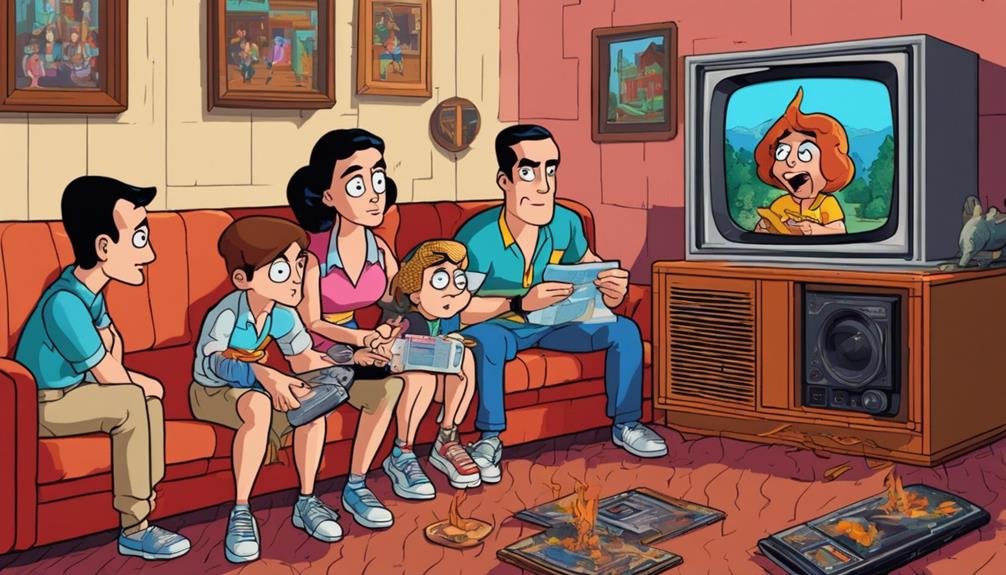
Venturing into the domain of time-travel, 'Meet The Quagmires', the 18th episode of season 5, adeptly intertwines humor and nostalgia, garnering significant acclaim for its ingenious homage to the classic film 'Back to the Future' and its infusion of 80s references and music. The episode skillfully navigates the intricate mechanics of time-travel as Peter inadvertently alters the course of his life, eliciting both laughter and sentimentality.
- The depiction of an alternate reality: The episode's brilliance lies in its portrayal of an alternative present, masterfully exploiting the element of surprise.
- Nostalgia: The episode's 80s references and music strike a chord with viewers, evoking a sense of nostalgia.
- Humor: The wit and humor, characteristic of 'Family Guy', is effectively maintained, ensuring a balance between the episode's thematic complexity and comedic deliverance.
The "Simpsons Guy" Episode

Shifting from the realm of time-travel to the uncharted territory of cross-series interaction, the episode titled 'The Simpsons Guy' presents an intriguing crossover between Family Guy and The Simpsons, a feat that is commendable for its adept handling of character interactions set against a contrived plotline. The episode, leveraging the popularity of two iconic animated series, successfully blends the characteristics of both while maintaining the individuality of each.
| Series | Highlight |
|---|---|
| Family Guy | Stewie's interaction with Bart |
| The Simpsons | Homer's brief encounter with Peter |
| Crossover Episode | The contrived yet engaging plotline |
| Simpsons Guy | The shared screen time between both series |
Analyzing the episode, it offers a unique mix of humor, wit, and nostalgia, making it a standout in the repertoire of both animated series.
"PTV" Episode Analysis

With an impressive IMDb rating of 8.5, Family Guy's 'PTV' episode presents a provocative and satirical examination of television censorship and its implications, masterfully articulated through the creation of Peter's own TV network. The episode, belonging to the PTV season, is a bold commentary on FCC restrictions, offering a musical number that humorously criticizes these limitations.
- The musical number: This segment serves as a biting satire, with hilarious visuals that underscore the absurdity of censorship.
- Peter's TV network: This narrative device symbolizes defiance against censorship, emphasizing the importance of creative freedom.
- FCC restrictions: The episode's critique of these regulations highlights the stifling effect on artistic expression and public discourse.
In essence, 'PTV' is a potent blend of satire and social commentary, making it a standout in the Family Guy canon.
Diving Into "And Then There Were Fewer"

Delving into 'And Then There Were Fewer', it becomes apparent that Family Guy brilliantly showcases the classic whodunnit genre, seamlessly blending it with the show's signature humor during a dinner party setting. The mystery plot is well-constructed and filled with clever red herrings and misdirects, creating an engaging viewer experience.
The episode maintains a careful balance between suspense and comedy, with the goofy personalities of the characters shining through even in the midst of the mystery. The final reveal in this whodunnit episode is satisfyingly tied up, demonstrating the show's dedication to narrative coherence.
'And Then There Were Fewer' stands out as a demonstration of Family Guy's ability to innovate within its genre while staying true to its comedic roots.
"Back To The Pilot" Episode Insights
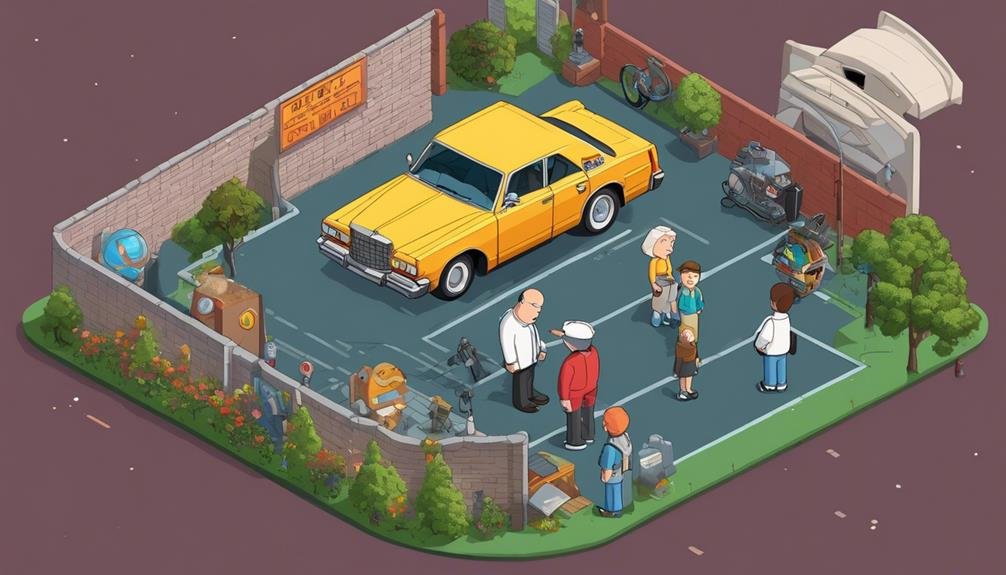
In the domain of Family Guy's most memorable episodes, 'Back To The Pilot' emerges as a particularly innovative narrative, leveraging meta-humor and a brilliant twist on time-travel stories to create a fresh and engaging viewer experience. This episode takes a bold leap, revisiting the show's humble beginnings in a unique time travel narrative, while incorporating self-referential humor in a way reminiscent of 'Simpsons Guy'.
- The use of meta-humor enhances the episode's appeal, offering a commentary on the show's evolution, including its graphical changes and voice actor modifications.
- The altered timeline narrative brings complexity, pushing boundaries with its 9/11 storyline, encouraging audiences to ponder the ripple effects of time travel.
- Despite its divergence from the typical Family Guy formula, 'Back To The Pilot' maintains the show's core essence, offering a memorable viewer experience.
"Road to the Multiverse" Discussed
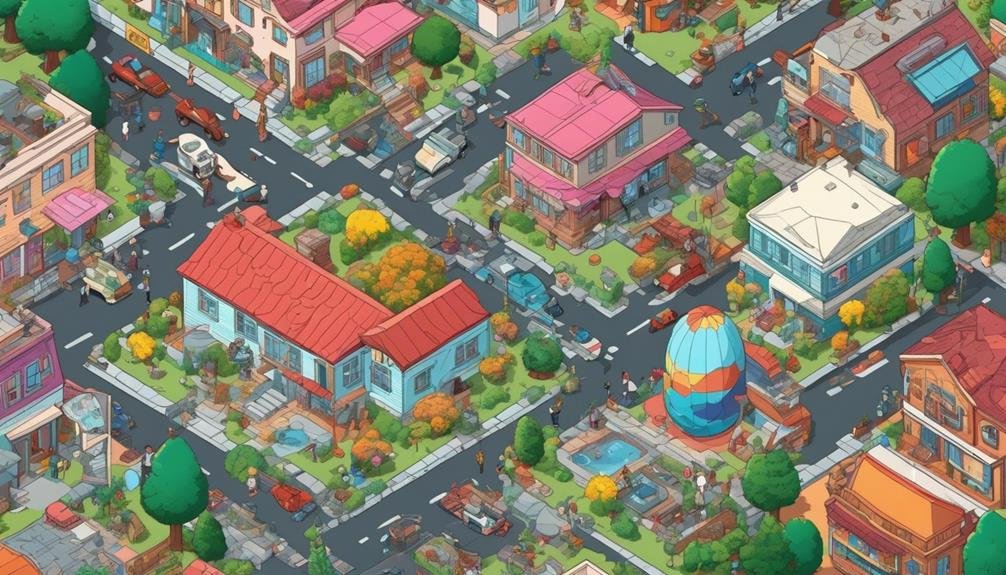
Garnering an impressive IMDb rating of 9.1, the episode 'Road to the Multiverse' stands out as a creative high point in the Family Guy series, demonstrating a remarkable blend of unique animation styles, witty dialogue, and comical sight gags. This episode takes protagonists Brian and Stewie on a thrilling, multiverse-hopping adventure, visiting numerous parallel universes, each rendered in distinctive animation styles.
The episode's clever use of varied visuals, combined with its sharp, humorous script, has led to considerable viewer acclaim. This acclaim extended beyond the television screen, inspiring the creation of a video game based on the episode's premise.
'Road to the Multiverse' is not just a standout episode, but a reflection of the creative heights animation can reach when innovative storytelling combines with artistic experimentation.
Frequently Asked Questions
What Is the Best Rated Episode of Family Guy?
The best rated episode of Family Guy, according to fan favorites and critic opinions, is 'Road to the Multiverse'. This episode's impact is notable for its unique content, character development, and cultural references.
What Is the Most PG Episode of Family Guy?
Considering factors such as parental guidance, series censorship, and episode ratings, the most PG-rated Family Guy episode is 'And Then There Were Fewer'. Its engaging storyline and suitable content make it appealing to kids' perception.
What Is the Lowest Rated Family Guy Episode?
The lowest rated Family Guy episode, 'Seahorse Seashell Party', suffered due to its controversial content. Despite an attempt at character development, audience reception was negative, impacting its ranking, largely due to its lack of humor and coherence.
Is Family Guy PG 13?
Family Guy, known for its controversial content, isn't classified as PG-13. Its animation rating is TV-14, indicating the need for parental guidance due to mature themes. Viewer discretion is advised for age suitability evaluation.
Conclusion
To summarize, Family Guy's undeniable impact on pop culture is evident. With episodes like 'Da Boom', 'Blue Harvest', and 'Three Kings', the series has consistently delivered clever humor and satire.
'Back to the Pilot' and 'Road to the Multiverse' continue to be fan-favorites, indicative of the show's longevity. In fact, the fascinating statistic that over 300 episodes have been produced across 19 seasons hints at the enduring popularity of this animated sitcom.
Da Boom is overrated, Three Kings deserves more recognition in this list! 🤔
Blue Harvest was overrated, Three Kings deserved higher recognition. Thoughts? 🤔
Blue Harvest was overrated, Three Kings deserves more recognition in the top episodes list.
Blue Harvest is overrated, Three Kings is the real gem. Fight me! 🤷♂️
Blue Harvest is overrated. Da Boom deserves more recognition for its humor.
Blue Harvest is overrated! Three Kings deserves the top spot, hands down.
Blue Harvest is overrated, Three Kings deserves more recognition in the top episodes list!
Blue Harvest is overrated, Da Boom deserves the top spot! Change my mind.
Blue Harvest may be overrated, but Da Boom doesnt deserve the top spot. Its impact may have been strong, but Blue Harvests legacy is undeniable. Time to reevaluate your priorities.
Blue Harvest is overrated, Three Kings deserves more recognition. Whos with me?
Blue Harvest is overrated! Three Kings deserves the top spot. Who agrees?
While I agree Da Boom and Blue Harvest are brilliantly crafted, isnt it strange that Three Kings didnt top the list? I mean, the storytelling was unique and the humor was top-notch.
Im puzzled why Road to the Multiverse isnt on this list? The creative storytelling and animation styles in that episode are unmatched. Surely, it deserves a spot in the top 15. Thoughts?
Interesting article, but isnt it curious how Road to the Multiverse didnt make the cut? Surely, its satirical take on parallel universes offers a unique comedic experience. Thoughts?
Did anyone else think the Da Boom episode was overrated? I mean, its good, but top 15 material? Also, Blue Harvest shouldve been ranked higher. Just some food for thought!
Interesting read, but how on earth did Da Boom top Blue Harvest? I mean, cmon, the Star Wars parody was pure genius. And wheres the love for Three Kings? If were talking creativity, that episodes reinterpretation of classic Stephen King stories was top-notch. I dont know guys, this list needs a rethink.
I gotta say, Im shocked Blue Harvest got such a high rating here! Honestly, it feels like Family Guy trying too hard to fit into the Star Wars universe. What about those heart-warming, funny episodes like Da Boom or Three Kings? They really show the essence of Family Guy, dont they? Sometimes less gimmick, more humor works better, imho.
Isnt it strange that Road to the Multiverse didnt make the list? I mean, come on, that episode was a comedic masterpiece!
Blue Harvest overrated much? Da Boom is the real deal! Why is it not higher in this list? Lets talk about that!
Blue Harvest over Da Boom? Madness! I reckon Three Kings is top-tier. Is nostalgia clouding our judgement here, guys?
Just read this 15 Top Family Guy Episodes article and I gotta say, how is Blue Harvest rated over Da Boom? The post-apocalyptic humor in Da Boom is way more original than a Star Wars spoof. And Three Kings? Come on, its a bit overrated, right? The humor is too niche. Thoughts, anyone?
I gotta say, Im surprised by these ratings! No love for Road to Rhode Island or Stewie Kills Lois? And seriously, Da Boom over PTV? Thats just madness. Also, how can you talk about iconic episodes without mentioning Stewie Loves Lois? Lets get some respect for the classics, guys!
Gotta say folks, Im surprised Road to the Multiverse didnt make the cut. That episode had me rolling! And Blue Harvest over Three Kings? The latter had way more pop culture references and clever humor. Also, why is Da Boom even on this list? Its barely funny! Just my two cents.
Interesting list, but why isnt Road to the Multiverse included? Its one of the most mind-bending episodes, mixing humour with theoretical science. Also, Id argue that Da Boom is overrated. Its good, but not top 3 good. And Three Kings was pure genius, deserves a higher spot.
Road to the Multiverse lacks consistency. Da Boom earns its spot. Three Kings is overhyped nostalgia.